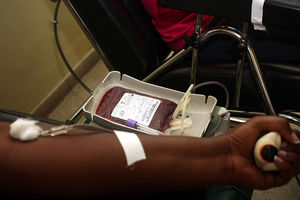
Dr Joseph Gatura, senior surgeon at Makindu sub-County Hospital, with his surgical team in the theatre.
After a successful C-section operation at Kibwezi sub-County Hospital in Makueni County, things took a turn for the worse when Samira Mwende began bleeding profusely.
Daniel Muoka, a nurse who was part of the surgical team, knew that they had less than an hour to save the mother’s life and her baby.
Mwende was experiencing post-partum haemorrhage (PPH — that is excessive bleeding after a woman gives birth.
As her daughter Faiza marks her first birthday, Mwende tearfully recalls the day she almost lost her life. She remembers vividly how medics struggled to keep her alive.
“I could hear the nurse’s voice like an echo, and then he covered me. But I was not really there; I was dying,” Mwende said.
Specialised treatment
The nearest hospital that could offer specialised treatment to help save the mother’s and child’s lives was Makueni County Referral Hospital or the Makindu sub-County Hospital. Both hospitals were an hour’s drive away in an ambulance.
“The likelihood of her dying was high, no matter how fast we moved. There was no time” Mr Muoka recalled.
The team of medics opted to call Dr Joseph Gatura, a senior surgeon at Makindu sub-County Referral Hospital. Dr Gatura drove himself to Kibwezi at 3am.
In a short while, he established that the placenta had crossed to part of the bladder, therefore blocking the uterus from contracting and stopping the bleeding.
“The patient had very little time to live. Had I delayed even by five minutes, I do not think she would have made it,” Dr Gatura told Sunday Nation.
There had to be a change of tack, said the surgeon who has practised medicine for nearly two decades.
“There are patients we wait to be brought at the referral hospital, but there are others we go to,” Dr Gatura said.
The surgeon was referring to patients like Mwende who experienced post-partum haemorrhage — a deadly complication responsible for two in every five maternal deaths in Kenya, according to the Ministry of Health 2017 report Confidential Enquiry into Maternal Deaths in Kenya.

Dr Joseph Gatura, senior surgeon at Makindu sub-County Hospital.
When post-partum haemorrhage occurs in low-level facilities like Kibwezi sub-County Hospital, healthcare workers refer the mothers to other hospitals which have experts and the right facilities. And while this is the right thing to do, most mothers do not survive the journey.
A 2022 study published in the journal BMC Pregnancy and Childbirth showed that the mothers who died in Migori County as a result of delays in the community or the patient deciding to go to the hospital, delays caused by infrastructure like roads, and delays in receiving quality care in poorly staffed and ill-equipped health facilities.
The quick response by Dr Gathura is part of a larger plan in Makueni County to reduce maternal mortality.
In 2021, data from the Kenya National Bureau of Statistics ranked the county among the top 10 in terms of maternal mortality with 479 deaths per 100,000 live births.
Makueni County is applying several strategies to bring down the deaths, including emergency care for patients such as Mwende.
Working with the Antenatal and Postnatal Care Research Collective (ARC) project in 2022, Makueni instituted the Networks of Care in 60 health facilities for the pilot. Makueni County’s Chief Officer of Health Dr Stephen Ndolo explained how the Networks of Care system works.
“The county mapped out all the resources we have from hospitals to surgeons, sources of blood and functional ambulances. We knew where they were, whether they were private or public hospitals. We then we linked the nearest higher level facility to a lower one, and put that poster at each facility with a phone number of who they should call,” Dr Ndolo told Sunday Nation in an interview.
“The county then gathered all the healthcare workers to agree on the information that should be collected when a patient is referred to a higher level facility or monitored so that when another team takes over they know what has been done. Using this information, we made specialised forms that healthcare workers fill,” he added.
It is from this Networks of Care system that Kibwezi Sub-County Hospital knew the closest hospital for Mwende to be treated was Makindu, and the most qualified healthcare personnel at the facility was Dr Gatura.
Makueni County did not pick the idea on a whim. The Networks of Care system has already saved lives in other parts of the world.
In the journal Maternal and Child Health, a study to evaluate the Networks of Care of 18 months in Nigeria reduced maternal mortality by more than 37 percent, halved the deaths of children under one month, and reduced stillbirths by 18 percent.
Mwende takes her daughter to greet the surgical team that saved their lives.
“There is nothing I can give in return to repay them for saving my life; it is so big. Only God can pay them,” she told Sunday Nation.












